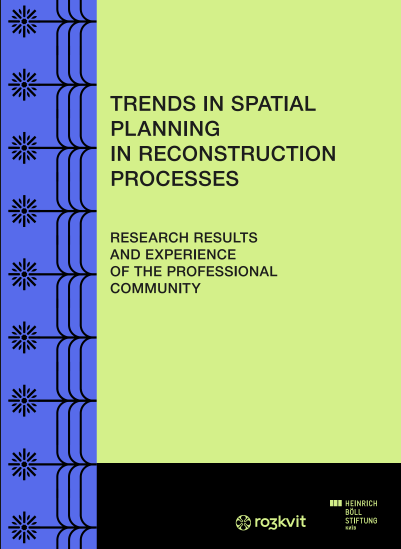Search by key words or by sector (energy, climate, buildings, agriculture, industry, environment, finance, EU accession etc)

Trailblazers. Ukraine’s Road to the EU and What the Polish Experience Can Teach Us
In this report, WiseEuropa takes a look at Poland’s own road to the EU in an attempt to draw out lessons that may be of value to Ukraine.

Trends in spatial planning in reconstruction processes
The goal of this project is to understand the key challenges and problems faced by the professional community of spatial planners in the time of war and reconstruction of Ukraine and to determine the potential for its consolidation to overcome them.

Guideline “How to Engage Residents in Decision Making in Hromadas: An Overview of Examples”
This guideline by Cedos describes the theoretical and practical aspects of engaging residents in hromadas decision-making, as well as key studies and instruments.

Deep-Dive into Details and Opinions on Circular (Re-)Construction in Ukraine
This report by ReThink focuses on circular construction, materials reuse and recycling practices in the built environment of Ukraine, addressing various aspects like current demolition methods, legislative and economic challenges for circularity, past and present circular construction practices, and potential for deeper pilot projects.

On the reconstruction front line: Ukrainian municipalities and the funding landscape
Ukrainian municipalities, local governments, citizens and volunteers are all on the front line. Not only do they face the challenges of war, but they also have to rebuild damaged infrastructure, assist internally displaced persons, provide basic services to the population, and support the army. But is there enough money to fund their vital efforts? And do municipalities have sufficient access to existing financial resources?
This research series by CEE Bankwatch and Ecoaction looks at the complex landscape of existing funding available to Ukrainian municipalities as they seek to meet their reconstruction needs.

Climate Damage Caused by Russia’s War in Ukraine
According to the report by the Initiative on GHG Accounting of War, greenhouse gas emissions attributable to 18 months (or 555 days) of the russian full-scale war in Ukraine total 150 million tCO2e. This is more than the annual GHG emissions from a highly industrialized country such as Belgium. GHG emissions continue to grow in different dimensions of the war, including those related to rebuilding Ukraine.

Shades of Green: Investing in Ukraine’s Recovery
The briefing paper presents pivotal recommendations intended to direct Ukraine towards a prosperous green recovery. It originates from an online discussion conducted in November 2023, organized by the Ukraine Climate Office, WWF-CEE and Ukraine, with the aim of stimulating discourse on the term “green” and its implications.

Roadmap for a climate-neutral, sustainable Ukrainian energy sector and its role in an integrated EU energy market
Postwar reconstruction in Ukraine will be a long and arduous process. The Ukraine Energy Roadmap, offered by the Europe-Ukraine Energy Transition Hub, analyzed the technical, financial, and legal aspects of this challenge; the detailed results are described in the corresponding three studies. IKEM summarizes these studies and provides recommendations across six major themes relevant to the energy transition.

Green Jobs And Post-War Reconstruction Of Ukraine
The study by Razom We Stand and the Resource and Analysis Center "Society and Environment" shows if Ukraine's post-war reconstruction is green, it could create more than 4.2 million additional jobs in five key sectors: transportation, energy, healthcare, education, and water.